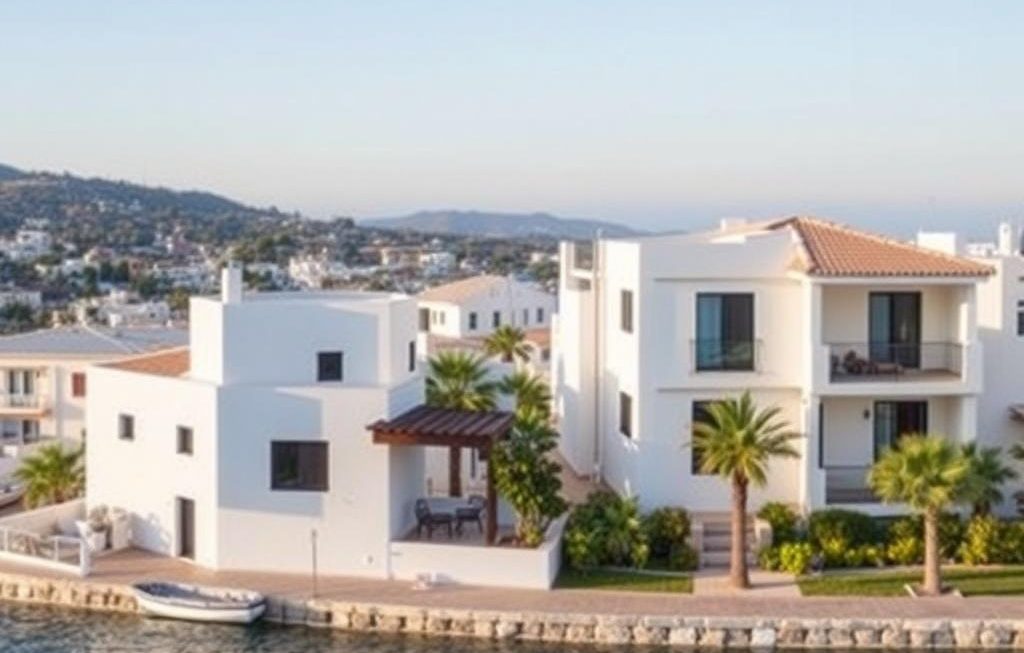If you’ve ever dreamed of owning a sunlit retreat on the Mediterranean coast, Cyprus undoubtedly sits high on the list. But for many non-residents, the path to secure a second home here brings its own set of unique financial challenges. Financing a property abroad is rarely straightforward, especially when navigating the intricacies of buy property in Cyprus as a foreigner. In this guide, we’ll unpack every critical detail about obtaining a second home loan in Cyprus, demystify mortgage Cyprus foreigners opt for, and highlight the landscape of Cyprus property finance—all while helping you understand current interest rates Cyprus banks offer.
Understanding the Landscape of Cyprus Property Finance for Non-Residents
Before diving into loan applications and mortgage terms, it’s crucial to grasp the local financing environment. Cyprus has increasingly opened its doors to international buyers, a trend reflected in more flexible mortgage options available to non-residents in the last decade. However, challenges remain, primarily due to regulatory frameworks and banks’ risk assessments specific to foreign borrowers.
Unlike some European countries where banks routinely provide loans to non-residents, Cypriot lenders are more conservative. This caution stems from a combination of economic factors and the relatively small local market size. Consequently, while financing is available, conditions often differ significantly from those offered to residents.
Foreign buyers need to navigate a careful balance of documentation, deposit requirements, and bank policies when financing a second home in Cyprus.
Most banks require a detailed proof of income, credit history, and sometimes employment stability outside Cyprus. Additionally, understanding the distinctions in loan-to-value ratios and how interest rates Cyprus banks apply to mortgages for foreigners is fundamental to realistic budgeting.
Key Eligibility Requirements for Non-Residents Applying for Mortgages in Cyprus
The first step in securing any second home loan Cyprus involves meeting specific eligibility benchmarks. Lenders treat foreign applicants differently depending on their nationality, the source of income, and perceived risk. Typically, non-residents should expect stricter scrutiny and, often, higher deposit requirements.
Typically, the main eligibility criteria include:
- Proof of a stable income—usually documented through tax returns, employment contracts, or business accounts.
- A clean credit history, ideally from both the applicant’s home country and any international credit checks.
- Demonstrable ability to service the loan, including a low debt-to-income ratio.
- Submission of a valid passport and residence status information.
- An initial deposit ranging from 30% to 50%, higher than for residents.
Some banks also request references from employers or previous lenders, adding layers of verification. Timing here matters; compiling these documents can take weeks, so prepare accordingly.
Expect more comprehensive background checks and larger down payments compared to local buyers.
How Much Deposit Is Required When Financing a Second Home in Cyprus?
When considering mortgage Cyprus foreigners, one of the biggest hurdles is the size of the down payment. While local residents may obtain loans with deposits as low as 20%, non-residents frequently face demands upwards of 30%, with some banks requesting even 40% or 50%, especially in the wake of the 2013 financial crisis that re-shaped lending practices significantly.
This higher initial deposit reflects the added risk banks perceive when lending to clients outside their jurisdiction. For a €400,000 property, for example, a non-resident might need to put down at least €120,000 to secure financing.
These hefty deposits can be a shock, but they’ve led to more competitive interest rates in some cases, as lenders compensate for risk by upfront capital security rather than penalizing with inflated loan costs later.
Current Interest Rates Cyprus Banks Offer for Non-Resident Mortgages
Discussing interest rates is key for anyone exploring Cyprus property finance. Rates vary depending on several factors, including loan size, term, borrower profile, and property location. In recent years, Cyprus witnessed a steady decline in interest rates, following trends across the Eurozone.
For non-residents, interest rates may be slightly higher than those for residents, often falling between 3.5% and 5%, depending on the bank and customer profile. Specific banks may offer fixed or variable rates; variable ones align with Euribor rates plus margins that can move with financial market fluctuations.
Consider that some Cypriot banks provide introductory rates below the average market, adjusting upwards after an initial period. Borrowers need to analyze what suits their financial plans best, whether preferring predictability or lower initial costs with potential future increases.
Interest rates for non-residents generally hover a bit higher but can still remain competitive within European standards.
The Application Process for a Second Home Loan Cyprus
The journey from initial inquiry to funds disbursal will pass through several well-defined phases.
It usually begins with a pre-approval stage, where the bank closely reviews financial documentation to gauge initial eligibility. Pre-approval allows buyers to approach sellers confidently, knowing their purchasing power.
Next comes the formal application, which involves:
- Submission of all required documents (income proof, credit reports, identification).
- Property valuation arranged by the lending institution.
- Approval based on combined factors, including appraisal results and borrower credentials.
- Signing the mortgage contract and arranging legal formalities.
Once everything is in place, the funds get released, and the buyer completes the property transfer. Throughout, communication between buyer, bank, and legal representatives remains vital.
Additional Costs to Account for When Buying Property in Cyprus
Many first-time buyers underestimate the true cost of securing a second home beyond the purchase price and mortgage. Cyprus property finance involves several extra expenses. Those can affect the overall budget significantly and should be taken into consideration from the outset.
Key additional costs include:
| Cost Type | Typical Percentage or Fee |
|---|---|
| Property Transfer Fees | 3% – 8% of property value |
| Stamp Duty | Up to €20,000 depending on property price |
| Legal Fees | 1% – 2% of property price |
| Mortgage Arrangement Fee | 0.5% – 1% of loan amount |
| Valuation Fee | €300 – €700 approximately |
Each of these can add thousands of euros to your overall budget, reinforcing the value of thorough financial planning.
Alternatives and Tips for Financing a Second Home in Cyprus
Not everyone will find traditional mortgages the best fit. Some non-residents combine personal financing—like home equity loans in their country of residence—with smaller local mortgages, reducing exposure to harsher lending terms. Others leverage cash purchases if currency conditions allow, avoiding loan complications altogether.
Seeking advice from specialist mortgage brokers or financial advisors familiar with Cyprus’s market can unearth tailored solutions. Often banks provide packages designed for international buyers, merging competitive rates with manageable down payments in collaboration with foreign lenders.
Keeping an eye on interest rates Cyprus banks offer over time is wise. Small shifts in these rates affect monthly repayments significantly on larger loans. Securing a rate lock or negotiating terms early can help stabilize finances.
Smart borrowers explore creative financing and local expertise to make buying a second home in Cyprus feasible and efficient.
Step-by-Step Guide to Applying for a Mortgage as a Foreigner
Approaching mortgage Cyprus foreigners can access with a roadmap simplifies what initially appears complex. Here’s a simple checklist:
- Assess your financial standing and affordability realistically.
- Research banks and compare Cyprus property finance products.
- Gather required documentation: identification, income proof, credit reports.
- Request a mortgage pre-approval to understand borrowing capacity.
- Choose a property and initiate formal mortgage application.
- Engage legal professionals to handle contracts and property verification.
- Undergo property valuation by bank-approved experts.
- Complete loan approval and sign mortgage agreements.
- Coordinate final payment transfer and property registration.
Patience and clear planning here prevent missteps. Confirming every requirement upfront saves delays in Cyprus’s bureaucratic processes.
What to Expect After You Secure Financing in Cyprus
With the mortgage secured, the journey continues. Owners should consider ongoing financial responsibilities: property taxes, maintenance costs, insurance requirements, and periodic mortgage repayments. Currency fluctuations can also impact monthly payments when foreign earnings finance loans.
Monitoring market conditions helps anticipate changes to interest rates Cyprus banks might enact during the mortgage term. Negotiating revision clauses or early repayment options adds flexibility.
Building a relationship with your bank’s local branch or mortgage officer proves advantageous for swift resolution of issues or refinancing opportunities in the future.
Ownership is a long-term commitment requiring awareness of ongoing costs and market shifts.
Unlocking Your Dream: Navigating Cyprus Financing with Confidence
Securing a second home in Cyprus as a non-resident may seem challenging, but armed with insight and a clear plan, it becomes an achievable milestone. Understanding lender expectations around mortgage Cyprus foreigners seek, organizing your finances, and carefully choosing the right bank are crucial steps to make this Mediterranean dream a reality. Interest rates Cyprus banks charge today remain competitive, especially for well-prepared applicants, though deposits are understandably steeper.
With careful attention to eligibility, documentation, and additional fees, you can confidently engage in Cyprus property finance and own a stunning second home on this island known for its blend of culture, climate, and investment potential. Realizing the idyllic lifestyle you envision starts with solid groundwork—the type this guide aims to provide at every stage.
Frequently Asked Questions
- Can non-residents get 100% financing for a property in Cyprus? No, non-residents typically must pay a down payment of at least 30-40%. Banks in Cyprus do not generally provide full financing to foreign buyers due to risk profiles.
- What documents are required for a mortgage application in Cyprus for foreigners? Valid passport, proof of income (tax returns, payslips), credit reports from home country, bank statements, and a deposit proof are usually mandatory.
- Are interest rates higher for foreign buyers compared to residents? Generally, yes. Interest rates for foreigners tend to be slightly higher, between 3.5% and 5%, reflecting higher perceived lending risk.
- How long does the mortgage approval process take for non-residents? The entire process can take 4 to 8 weeks, accounting for document verification, property valuation, and legal formalities.
- Are there local banks that specialize in foreigner mortgages in Cyprus? Yes, several banks have tailored packages for international buyers, often advertised through specialized brokers or real estate agencies.
- What are the main additional costs besides the property price? Transfer fees, stamp duty, legal fees, mortgage arrangement fees, and valuation costs are common additional expenses.
- Can I switch my mortgage from variable to fixed interest rate after approval? Some banks offer options to convert between rates mid-term, but it depends on the loan terms. Always clarify options before signing.



